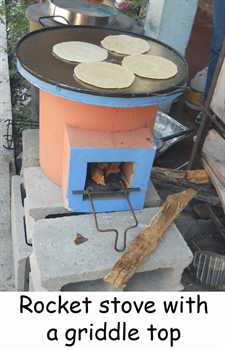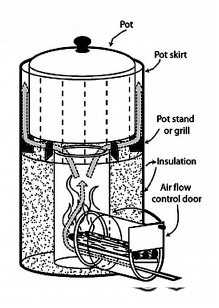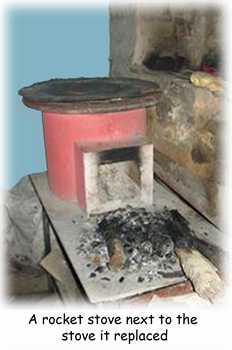
Newsletter - September, 2013
| September, 2013 Assuredly, I say to you, inasmuch as you did it to one of the least of these My brethren, you did it to Me." Matt. 25:40 Published by the Society of the Good Shepherd, P. O. Box 122, Amberson, PA 17210. (717) 349-7033 |
Deborah and I just returned from our semi-annual mission trip to Honduras last week. The main purposes of these trips to Honduras are to visit with the Society’s microloan beneficiaries there and to meet with the Society’s Honduran directors. However, one of the things we like about being in Honduras, is that we invariably become aware of needs and opportunities for those of us here in the U.S. to be able to help our brothers and sisters in Honduras. This last trip was no exception.
 One of the most significant events of the trip occurred as we were leaving Siguatepeque to head to the airport in San Pedro Sula. On our way out of town, Luis Vega pointed out an old woman walking along the road. He told us what a hard worker she was and that he was hoping to buy her a special wood-burning cooking stove. He explained that the stove is made in Honduras by the service organization, Rotary International, as a way to help the poor. Luis then explained what is special about this small wood-burning cooking stove.
In Honduras, these stoves are often called Justa (HOO-sta) stoves because the first one that Rotary International built was for a Honduran woman named Justa. Throughout most of the world, these stoves are better known as rocket stoves. They’re named for the way that air moves through them.
One of the most significant events of the trip occurred as we were leaving Siguatepeque to head to the airport in San Pedro Sula. On our way out of town, Luis Vega pointed out an old woman walking along the road. He told us what a hard worker she was and that he was hoping to buy her a special wood-burning cooking stove. He explained that the stove is made in Honduras by the service organization, Rotary International, as a way to help the poor. Luis then explained what is special about this small wood-burning cooking stove.
In Honduras, these stoves are often called Justa (HOO-sta) stoves because the first one that Rotary International built was for a Honduran woman named Justa. Throughout most of the world, these stoves are better known as rocket stoves. They’re named for the way that air moves through them. Although the stoves look rather simple, a considerable amount of engineering science has gone into them. They were designed in 1984 by Dr. Larry Winiarski as a way to help impoverished people in developing countries. The stoves dramatically increase fuel efficiency while greatly reducing smoke and harmful emissions. The stoves were purposefully invented without patent protection so that anyone can build these stoves following the basic design that Dr. Winiarski invented. Rotary International builds and sells them in Honduras for $50 each—about what an American family of four spends in eating out.
 The diagram on the right shows the design of these stoves. There are four essential features to the rocket stove:
The diagram on the right shows the design of these stoves. There are four essential features to the rocket stove: 1. It begins with a horizontal cylinder that is fitted into a vertical chimney and combustion chamber.
2. This rocket elbow is surrounded first by insulation and then by the body of the stove, which can be made of cement, metal, or clay. The insulation is important so that the heat from the wood fire is not lost into the body of the stove.
3. The third key feature is a small grate placed inside the horizontal chamber, on which the wood sticks rest. This tiny features is important because it allows fresh air to enter the fuel chamber from beneath the burning wood, enabling the air to be preheated before it enters the vertical combustion chamber.
4. Finally, on top of the stove rests a small metal pot skirt that funnels the heat to the cooking pot or griddle.

The Science Behind the Rocket Stove
As in many developing countries, most people cook on inefficient, open, wood-burning stoves. These stoves waste costly fuel and fill the cooking area (which is usually indoors) with clouds of smoke. With a rocket stove, only the tips of the sticks are burned—conserving the fuel and drastically reducing the smoke. The small horizontal fuel tube not only requires less fuel wood, but it also restricts the amount of cold air that can get into the stove. The actual combustion is limited to a small, insulated space at the base of the chimney. As a result, most of the energy in the wood sticks is converted to heat.
How to Help the Poor with the Rocket Stove
Of course, our main interest isn’t in science, but in helping the poor. And the rocket stove can do this very thing in a remarkable way. At the beginning of 2013, through a number of donations, Luis’ church was able to donate dozens of rocket stoves to the families in the nearby rural community of Balibrea. Here are two of the results:
1. In the average household, fuel consumption dropped by 1/2 to 2/3rds. Typically, these families were spending $1.50 to $2.00 a day for wood sticks to burn in their cooking stoves. So within 3 months, most families saved enough to pay for the stoves (if they had been buying them). Rotary International has found that their stoves—made of concrete and rebar, using vermiculite for insulation—usually last 10 years or more, so the savings to these impoverished families over the life of the stove is considerable.
2. In 2012, 64 people from Balibrea had to go to the hospital because of acute respiratory problems from smoke inhalation. So far in 2013, there have been only 3 such cases.
So the stoves bless people in more than one way. They are a gift that keeps on giving because they save people money day in and day out. Second, they provide a huge health benefit. Even the people who don’t get sick enough to have to go to the hospital are still damaging their lungs from daily breathing so much smoke from conventional wood cooking stoves.
What Can We Do?
Here is what I would like to suggest: The next time your family is planning to eat out, why not forego that pleasure one time and send the $50 you save to the Society to buy a rocket stove for a needy Honduraño. An additional $40 covers the cost of transporting the stove to the needy family, setting it up, training the family in the use of it, and making follow up visits to make certain the stove is being used properly. Your entire gift will go to the stove and these costs. Your gift will save the recipient at least $500 in fuel over the life of the stove and will provide a major health benefit as well.
If you’re not in a position to donate $90, then give $50, $25 or whatever you can, and we’ll pair it with someone else’s donation. If you can afford to give more than one stove, you can bless that many more people!
Please indicate that your donation is towards a rocket stove. If you would like to receive a picture of the specific person your stove goes to, let us know and we’ll be glad to do that. David Bercot
Click on the following link if you would care to make a donation to the work in Honduras: Donations
|
|